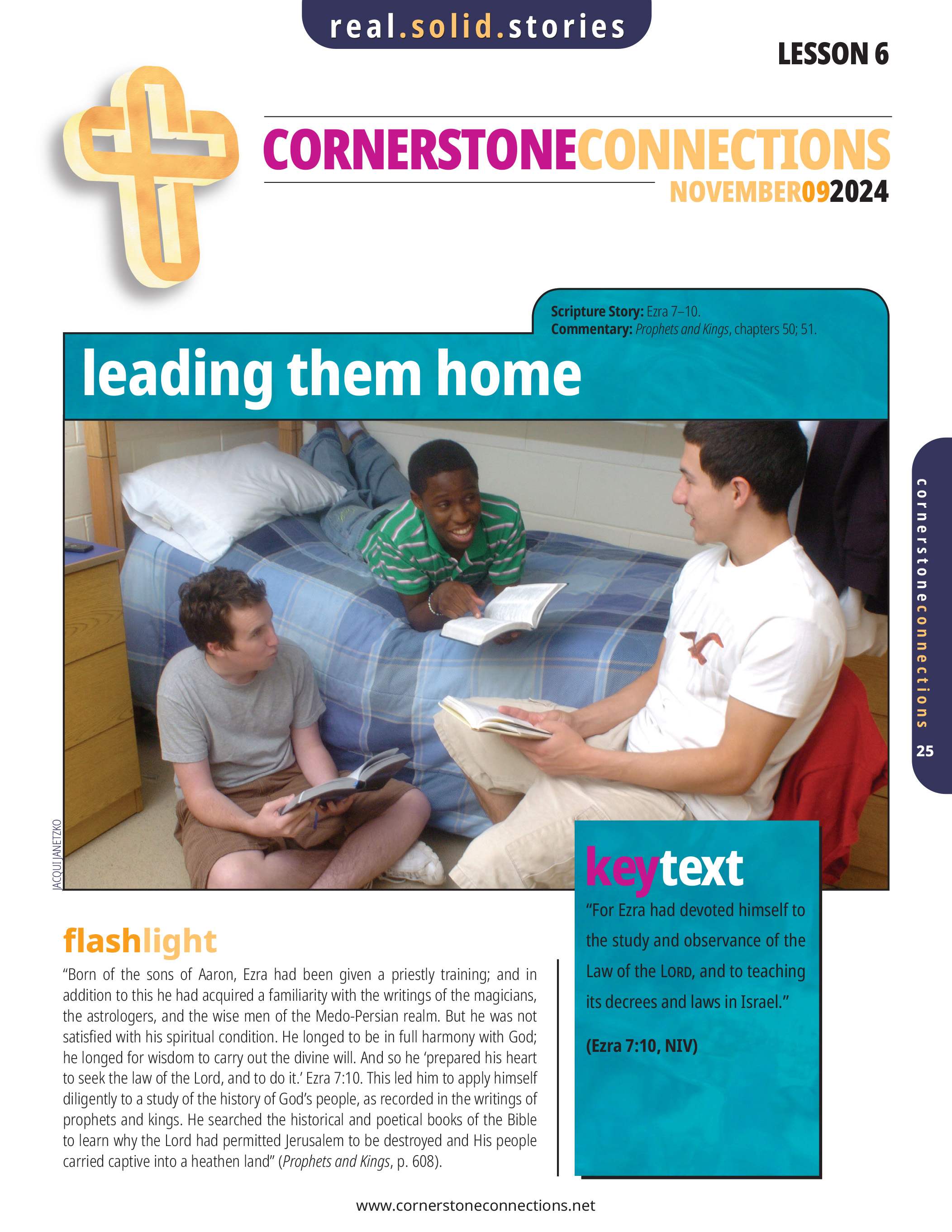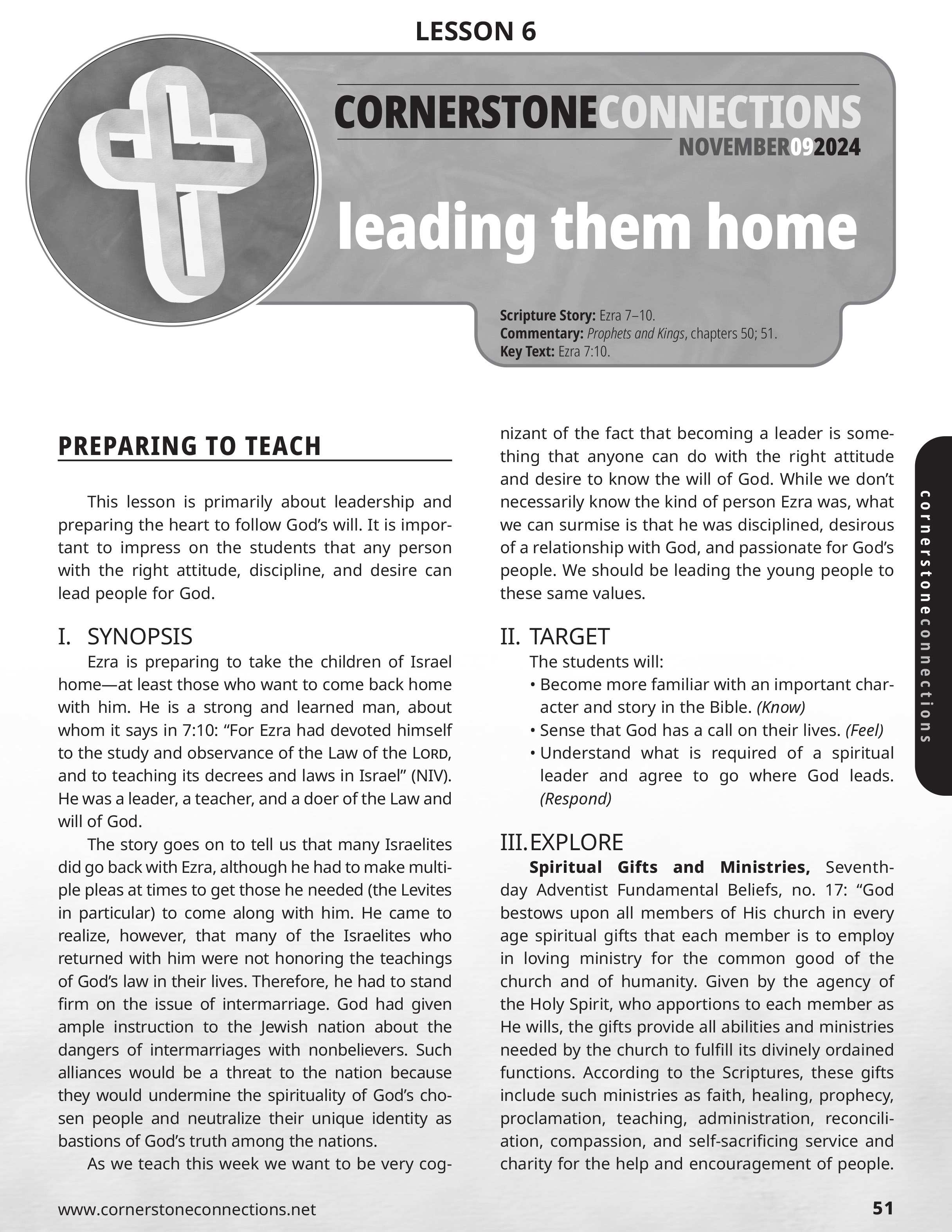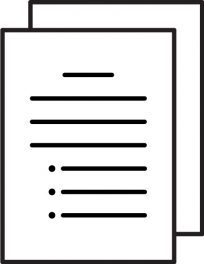"Leading Them Home"
Click below to download the Cornerstone Connections leader’s guide and student lesson. This week’s resources also include two lesson plans and a discussion starter video which offer different ways of looking at the topic. Each lesson plan includes opening activities, scripture passages, discussion questions, and real-life applications.
Ezra sparks a spiritual revival in the people of Israel.
Royalty in Ruin (Prophets and Kings)
Chapter 50 - Ezra, the King’s Trusted Friend

Royalty in Ruin (Prophets and Kings)
Chapter 51 - Ezra Sparks a Spiritual Revival

During this past summer there were a lot of fires on the West Coast. Many people had to evacuate their homes and flee to safety. Can you imagine the emotions people went through as they started the drive that would take them back to where their homes stood before the fires? Or, did your family have this experience? Whose homes would still be there? What would the landscape look like? What could be rebuilt? How long would it take? It must have been like this for the exiles as they returned to their homeland. Today’s lesson will explore what it was like to go from living in captivity to returning home.
Ask your students to describe:
The weirdest food they’ve ever eaten
Their least favorite homemade dish
Their favorite homemade dish
Their family’s most memorable tradition involving food
Why are food and family so closely related?
What makes a tradition so important?
After being gone from home for a while, why does one start to miss a homecooked meal?
When you’ve been gone from home for a long time, being home again is great, but sometimes changes have taken place while you were gone. (Perhaps this applies to going back to a relative’s home, such as a grandparent’s.) Changes have often taken place since you were last there. Not everything is the way it was. Some changes are for the better and others, not so much. You wonder if the problems will be fixed or if they will alter life forever.
Read Ezra 7:13-17.
13 Now I decree that any of the Israelites in my kingdom, including priests and Levites, who volunteer to go to Jerusalem with you, may go. 14 You are sent by the king and his seven advisers to inquire about Judah and Jerusalem with regard to the Law of your God, which is in your hand. 15 Moreover, you are to take with you the silver and gold that the king and his advisers have freely given to the God of Israel, whose dwelling is in Jerusalem, 16 together with all the silver and gold you may obtain from the province of Babylon, as well as the freewill offerings of the people and priests for the temple of their God in Jerusalem. 17 With this money be sure to buy bulls, rams and male lambs, together with their grain offerings and drink offerings, and sacrifice them on the altar of the temple of your God in Jerusalem.
How generous was Artaxerxes?
When have you been in a situation where you were given something that you didn’t deserve or expect?
How did it make you feel?
How do you think Ezra and the people felt with Artaxerxes’ generosity?
Read Ezra 7:27-28.
27 Praise be to the Lord, the God of our ancestors, who has put it into the king’s heart to bring honor to the house of the Lord in Jerusalem in this way 28 and who has extended his good favor to me before the king and his advisers and all the king’s powerful officials. Because the hand of the Lord my God was on me, I took courage and gathered leaders from Israel to go up with me.
What was Ezra’s response to the king?
How have you felt after God answered your prayers?
Read Ezra 8:21-23
21 There, by the Ahava Canal, I proclaimed a fast, so that we might humble ourselves before our God and ask him for a safe journey for us and our children, with all our possessions. 22 I was ashamed to ask the king for soldiers and horsemen to protect us from enemies on the road, because we had told the king, “The gracious hand of our God is on everyone who looks to him, but his great anger is against all who forsake him.” 23 So we fasted and petitioned our God about this, and he answered our prayer.
What is Ezra’s main concern in this passage?
Describe a situation where your faith and trust in God were tested.
Read Ezra 10:1-4.
While Ezra was praying and confessing, weeping and throwing himself down before the house of God, a large crowd of Israelites—men, women and children—gathered around him. They too wept bitterly. 2 Then Shekaniah son of Jehiel, one of the descendants of Elam, said to Ezra, “We have been unfaithful to our God by marrying foreign women from the peoples around us. But in spite of this, there is still hope for Israel. 3 Now let us make a covenant before our God to send away all these women and their children, in accordance with the counsel of my lord and of those who fear the commands of our God. Let it be done according to the Law. 4 Rise up; this matter is in your hands. We will support you, so take courage and do it.”
What is the main concern or principle in this passage?
If you had the opportunity to preach a sermon in your local church about this passage, what would you tell the members of the congregation?
Read Acts 1:6-11.
6 Then they gathered around him and asked him, “Lord, are you at this time going to restore the kingdom to Israel?”
7 He said to them: “It is not for you to know the times or dates the Father has set by his own authority. 8 But you will receive power when the Holy Spirit comes on you; and you will be my witnesses in Jerusalem, and in all Judea and Samaria, and to the ends of the earth”
9 After he said this, he was taken up before their very eyes, and a cloud hid him from their sight.
10 They were looking intently up into the sky as he was going, when suddenly two men dressed in white stood beside them. 11 “Men of Galilee,” they said, “why do you stand here looking into the sky? This same Jesus, who has been taken from you into heaven, will come back in the same way you have seen him go into heaven.”
Why did Jesus go back to Heaven?
What must it have been like when Jesus got back home and saw His Father again?
What promise does Jesus leave with His disciples/us?
Read Revelation 22:7-11.
7 “Look, I am coming soon! Blessed is the one who keeps the words of the prophecy written in this scroll.”
8 I, John, am the one who heard and saw these things. And when I had heard and seen them, I fell down to worship at the feet of the angel who had been showing them to me. 9 But he said to me, “Don’t do that! I am a fellow servant with you and with your fellow prophets and with all who keep the words of this scroll. Worship God!”
10 Then he told me, “Do not seal up the words of the prophecy of this scroll, because the time is near. 11 Let the one who does wrong continue to do wrong; let the vile person continue to be vile; let the one who does right continue to do right; and let the holy person continue to be holy.”
How does the concept of this passage relate to the one found in Ezra 10:1-4?
What promise does Jesus give His followers?
What is it going to be like to go to Heaven with Jesus?
Most people like to be home (though during this pandemic this may not be as true for everyone). Have you ever been gone from home for a long time? What was it like to get home? Was everything the same as when you left? Were the changes good? In today’s lesson Israel returned home, but everything wasn’t the way people remembered it. Things had changed and not for the better. However, God provided a way to get things back to normal. This world isn’t our home. God has promised that He is going to come back and get us so that we can spend eternity with Him. The only requirement is that we believe in Him, stay connected to Him, and let Him guide us through His word while He is gone.
On your electronic device or a piece of paper write down three lists.
1. Things you like about living on earth.
2. Things you wish were different.
3. What you are looking forward to doing and seeing when Jesus takes you to Heaven.

For a Relational Bible Study (RBS) you’ll want to get into the Scripture passage and encourage the youth to imagine participating in the story while it’s happening. Then you will be able to better apply it to your own situation today.
You will need to ask God for the Holy Spirit to be present as your small group discusses the questions (no more than 3-6 people in a group is recommended). Start with the opening question. It is a personal question and the answer is unique for each individual. There is no right answer and nobody is an expert here, so don’t be surprised when you hear different responses. You are depending on the Holy Spirit to be present and to speak through your group. Say what God prompts you to say, and listen to what others share.
Take turns reading the chapter out loud. Follow that with giving the students some time to individually mark their responses to the questions (a PDF version of the handout is available as a download). This gives each person a starting point for responding when you start to share as a group. Next, begin the discussion by asking the students to share what they marked and why on each question as you work your way through. Feel free to take more time on some questions than others as discussion warrants.
Encourage each person in the group to apply what is discussed to their personal lives and to share with the group what they believe God wants them to do. Then ask them to pray that God will help each of them to follow through in doing so. Remind them to expect that God will show them ways to live out the message of this passage in the coming week, and that they are free to ask others in the group to help hold them accountable.
Through the month of October, the Cornerstone Connections lessons have focused on God’s people returning from Babylon to Jerusalem following the time of Daniel. The Medo-Persian empire had conquered Babylon, but continued to rule from there.
The first half of the book of Ezra described several waves of Jews who returned to Jerusalem to re-build the temple. It was a rocky and irregular project, but finally led to the completion of the temple itself, although not much of the city, and there was no wall of protection around the former city.
Back in the Medo-Persian capital of Babylon, the captivating story of Esther becoming queen necessitated two weeks of our lessons. Following this, the Medo-Persian, now primarily Persian, attitude toward the Jews certainly was positive. Could this be the reason King Artaxerxes (Ahasuerus) gave these Jews the “Red Carpet Treatment”? Not only was Esther the queen, but her older cousin, Mordecai, was the king’s right-hand man. And wicked Haman’s plot to eliminate the Jews backfired in his own death on the gallows, and the Jews defending themselves against their enemies.
With this background, we start the second half of the book of Ezra and another wave of Jewish exiles returning to Jerusalem. We’ll limit ourselves to just two chapters in this section, chapters seven and eight. You may want to create your own Relational Bible Study for the last two chapters. You are certain to find, with the inspiration of the Holy Spirit, valuable gems in those chapters as well.
When were you treated better than you expected or better than you deserved?
Read Ezra 7:1-28 and Ezra 8:1-36.
Ezra 7
Ezra Comes to Jerusalem
1 After these things, during the reign of Artaxerxes king of Persia, Ezra son of Seraiah, the son of Azariah, the son of Hilkiah, 2 the son of Shallum, the son of Zadok, the son of Ahitub, 3 the son of Amariah, the son of Azariah, the son of Meraioth, 4 the son of Zerahiah, the son of Uzzi, the son of Bukki, 5 the son of Abishua, the son of Phinehas, the son of Eleazar, the son of Aaron the chief priest—6 this Ezra came up from Babylon. He was a teacher well versed in the Law of Moses, which the Lord, the God of Israel, had given. The king had granted him everything he asked, for the hand of the Lord his God was on him. 7 Some of the Israelites, including priests, Levites, musicians, gatekeepers and temple servants, also came up to Jerusalem in the seventh year of King Artaxerxes.
8 Ezra arrived in Jerusalem in the fifth month of the seventh year of the king. 9 He had begun his journey from Babylon on the first day of the first month, and he arrived in Jerusalem on the first day of the fifth month, for the gracious hand of his God was on him. 10 For Ezra had devoted himself to the study and observance of the Law of the Lord, and to teaching its decrees and laws in Israel.
King Artaxerxes’ Letter to Ezra
11 This is a copy of the letter King Artaxerxes had given to Ezra the priest, a teacher of the Law, a man learned in matters concerning the commands and decrees of the Lord for Israel:
12 Artaxerxes, king of kings,To Ezra the priest, teacher of the Law of the God of heaven:Greetings. 13 Now I decree that any of the Israelites in my kingdom, including priests and Levites, who volunteer to go to Jerusalem with you, may go. 14 You are sent by the king and his seven advisers to inquire about Judah and Jerusalem with regard to the Law of your God, which is in your hand. 15 Moreover, you are to take with you the silver and gold that the king and his advisers have freely given to the God of Israel, whose dwelling is in Jerusalem, 16 together with all the silver and gold you may obtain from the province of Babylon, as well as the freewill offerings of the people and priests for the temple of their God in Jerusalem. 17 With this money be sure to buy bulls, rams and male lambs, together with their grain offerings and drink offerings, and sacrifice them on the altar of the temple of your God in Jerusalem.
18 You and your fellow Israelites may then do whatever seems best with the rest of the silver and gold, in accordance with the will of your God. 19 Deliver to the God of Jerusalem all the articles entrusted to you for worship in the temple of your God. 20 And anything else needed for the temple of your God that you are responsible to supply, you may provide from the royal treasury.
21 Now I, King Artaxerxes, decree that all the treasurers of Trans-Euphrates are to provide with diligence whatever Ezra the priest, the teacher of the Law of the God of heaven, may ask of you—22 up to a hundred talents of silver, a hundred cors of wheat, a hundred baths of wine, a hundred baths of olive oil, and salt without limit. 23 Whatever the God of heaven has prescribed, let it be done with diligence for the temple of the God of heaven. Why should his wrath fall on the realm of the king and of his sons? 24 You are also to know that you have no authority to impose taxes, tribute or duty on any of the priests, Levites, musicians, gatekeepers, temple servants or other workers at this house of God.
25 And you, Ezra, in accordance with the wisdom of your God, which you possess, appoint magistrates and judges to administer justice to all the people of Trans-Euphrates—all who know the laws of your God. And you are to teach any who do not know them. 26 Whoever does not obey the law of your God and the law of the king must surely be punished by death, banishment, confiscation of property, or imprisonment.
27 Praise be to the Lord, the God of our ancestors, who has put it into the king’s heart to bring honor to the house of the Lord in Jerusalem in this way 28 and who has extended his good favor to me before the king and his advisers and all the king’s powerful officials. Because the hand of the Lord my God was on me, I took courage and gathered leaders from Israel to go up with me.
Ezera 8
List of the Family Heads Returning With Ezra1 These are the family heads and those registered with them who came up with me from Babylon during the reign of King Artaxerxes:
2 of the descendants of Phinehas, Gershom;of the descendants of Ithamar, Daniel;of the descendants of David, Hattush 3 of the descendants of Shekaniah;of the descendants of Parosh, Zechariah, and with him were registered 150 men;
4 of the descendants of Pahath-Moab, Eliehoenai son of Zerahiah, and with him 200 men;
5 of the descendants of Zattu, Shekaniah son of Jahaziel, and with him 300 men;
6 of the descendants of Adin, Ebed son of Jonathan, and with him 50 men;
7 of the descendants of Elam, Jeshaiah son of Athaliah, and with him 70 men;
8 of the descendants of Shephatiah, Zebadiah son of Michael, and with him 80 men;
9 of the descendants of Joab, Obadiah son of Jehiel, and with him 218 men;
10 of the descendants of Bani, Shelomith son of Josiphiah, and with him 160 men;
11 of the descendants of Bebai, Zechariah son of Bebai, and with him 28 men;
12 of the descendants of Azgad, Johanan son of Hakkatan, and with him 110 men;
13 of the descendants of Adonikam, the last ones, whose names were Eliphelet, Jeuel and Shemaiah, and with them 60 men;
14 of the descendants of Bigvai, Uthai and Zakkur, and with them 70 men.
The Return to Jerusalem
15 I assembled them at the canal that flows toward Ahava, and we camped there three days. When I checked among the people and the priests, I found no Levites there. 16 So I summoned Eliezer, Ariel, Shemaiah, Elnathan, Jarib, Elnathan, Nathan, Zechariah and Meshullam, who were leaders, and Joiarib and Elnathan, who were men of learning, 17 and I ordered them to go to Iddo, the leader in Kasiphia. I told them what to say to Iddo and his fellow Levites, the temple servants in Kasiphia, so that they might bring attendants to us for the house of our God. 18 Because the gracious hand of our God was on us, they brought us Sherebiah, a capable man, from the descendants of Mahli son of Levi, the son of Israel, and Sherebiah’s sons and brothers, 18 in all; 19 and Hashabiah, together with Jeshaiah from the descendants of Merari, and his brothers and nephews, 20 in all. 20 They also brought 220 of the temple servants—a body that David and the officials had established to assist the Levites. All were registered by name.
21 There, by the Ahava Canal, I proclaimed a fast, so that we might humble ourselves before our God and ask him for a safe journey for us and our children, with all our possessions. 22 I was ashamed to ask the king for soldiers and horsemen to protect us from enemies on the road, because we had told the king, “The gracious hand of our God is on everyone who looks to him, but his great anger is against all who forsake him.” 23 So we fasted and petitioned our God about this, and he answered our prayer.
24 Then I set apart twelve of the leading priests, namely, Sherebiah, Hashabiah and ten of their brothers, 25 and I weighed out to them the offering of silver and gold and the articles that the king, his advisers, his officials and all Israel present there had donated for the house of our God. 26 I weighed out to them 650 talents of silver, silver articles weighing 100 talents, 100 talents of gold, 27 20 bowls of gold valued at 1,000 darics, and two fine articles of polished bronze, as precious as gold.
28 I said to them, “You as well as these articles are consecrated to the Lord. The silver and gold are a freewill offering to the Lord, the God of your ancestors. 29 Guard them carefully until you weigh them out in the chambers of the house of the Lord in Jerusalem before the leading priests and the Levites and the family heads of Israel.” 30 Then the priests and Levites received the silver and gold and sacred articles that had been weighed out to be taken to the house of our God in Jerusalem.
31 On the twelfth day of the first month we set out from the Ahava Canal to go to Jerusalem. The hand of our God was on us, and he protected us from enemies and bandits along the way. 32 So we arrived in Jerusalem, where we rested three days.
33 On the fourth day, in the house of our God, we weighed out the silver and gold and the sacred articles into the hands of Meremoth son of Uriah, the priest. Eleazar son of Phinehas was with him, and so were the Levites Jozabad son of Jeshua and Noadiah son of Binnui. 34 Everything was accounted for by number and weight, and the entire weight was recorded at that time.
35 Then the exiles who had returned from captivity sacrificed burnt offerings to the God of Israel: twelve bulls for all Israel, ninety-six rams, seventy-seven male lambs and, as a sin offering, twelve male goats. All this was a burnt offering to the Lord. 36 They also delivered the king’s orders to the royal satraps and to the governors of Trans-Euphrates, who then gave assistance to the people and to the house of God.
1. Who was Ezra?
A great organizer.
A tremendous motivator.
A descendant of Aaron, the first high priest of Israel.
A scribe—very familiar with God’s law.
The king of Persia.
A relative of the king of Persia.
Someone with deep roots in Babylon.
A military leader.
Other.
2. What did the king include in his letter for Ezra’s endorsement?
A promise of protection for travel.
A promise of protection once the exiles got to Jerusalem.
Lots of money.
Worship leaders to reinstate worship to Yahweh in Jerusalem.
Permission for any Jew to leave Babylon for Jerusalem.
Access to the king’s storehouse.
More resources after they arrived in Jerusalem.
A variety of animals so they could start a zoo in Jerusalem.
Other.
3. Why was the king so generous for the returning Jews?
The king was a nice guy.
The gracious hand of God was on the king.
The gracious hand of God was on Ezra.
Esther was the queen.
Mordecai was the king’s right-hand man.
He wanted to expand his kingdom.
He wanted the Jews out of Babylon.
He believed in the God of the Jews.
Other.
4. Why didn’t any Levites volunteer to return to Jerusalem (Ezra 8:15)?
The rebuilt temple wasn’t as grand as the one Solomon had built.
They wanted a special invitation from Ezra.
None of their friends were going.
They preferred their lives in Babylon.
Born in exile, they didn’t know how to lead in worship to Yahweh.
They didn’t like some of the people who were going to Jerusalem.
Just because you’re born to worship doesn’t mean you will.
None of them liked Ezra.
Other.
5. Why did Ezra have the group fast and pray three days before departing?
This would build up their energy and endurance.
He needed the people to be highly disciplined.
Ezra considered prayer vital; not just something short at the start.
They were taking lots of wealth with no armed guards.
To make sure they were right with God.
He had a lot on his mind.
Spiritual practices matter more than physical abilities.
That’s what Esther had done (Esther 4:15-16).
Other.
6. Why did this group make it safely to Jerusalem?
The gracious hand of the Lord was on them.
Good leadership.
Angels protected them.
They were lucky.
Everyone knew they had the king’s support.
Nobody knew they were doing this.
They had armed escorts.
Other.
7. What has God clearly given you? Was any of this miraculous?
8. When has God protected you from harm or evil?
What a change! The Jews had been labeled as trouble-makers and all people were given permission to eradicate them on a given day. After that was reversed, the book of Ezra described how they were favored to the point of receiving the “Red Carpet Treatment.”
What did God provide for them? What part did they play? Why didn’t more, especially the Levites, want to return to Jerusalem? God opened the storehouses for the faithful Jews, both in the capital of Babylon and in the area around Jerusalem. The taxes that were to go to the king in the capital could be diverted directly to Jerusalem. Things seem to be getting better and better. Is this too good to be true?
The coronavirus pandemic continues to oppress and depress us. The “tested positive” results don’t seem to stop. In some of the places where they were dropping, they are now spiking again. What will happen this winter? Will students really return to school? Will they be able to stay in school? What even is school? When will we ever move beyond this? The people in the book of Ezra seem to be having times that are much better than our own right now. But we can take the message from Ezra and begin to live it out right now in our exhausted world. Here are a few ideas, based on our passage of study in Ezra.
THANK GOD
Just as the Jews who made it to Jerusalem took time to celebrate and thank God, you can do the same. There’s no need to wait until later this month for the Thanksgiving holiday. Do it this week!
• You can download the “Thank God” handout that has seven different areas within which to give thanks to God.
• You can focus on a different area each day or include each area each day for seven days.
• Feel free to adapt this to your specific setting.
DOWNLOAD HANDOUT
PRAY FOR PROTECTION
Ezra had his group spend three days fasting and praying before their trip with all that gold and silver and the temple utensils. He didn’t want to ask the king for armed guards since the God of the Jews was the Mighty One who would protect him. And God did protect them (Ezra 8:21-23, 32).
But what about today? With the coronavirus pandemic, this is a time to pray for protection, just as Ezra and the people did more than 2,500 years ago.
• Pray for God’s protection on the people in your country.
• Pray for protection for essential workers in health care, education, food services, utilities, public transportation, etc.
• Pray for yourself and your family, friends, and classmates.
HUMBLE YOURSELF
The terms “fast and pray” might have caught your attention in Ezra 8:21 more than “humble ourselves.” Humility might be valued in other people, but who wants to be humble themselves? And who wants to be humiliated? The Billy Graham Evangelistic Association has suggested ways we can humble ourselves, based on various Scripture passages. You can pick and choose one or more of these and put it into practice this week:




